December 21, 2022 - No. 63
Quebec Government Tables Offers to Public Sector Workers
Workers' Reject Attempt to Impose Wages and Working Conditions
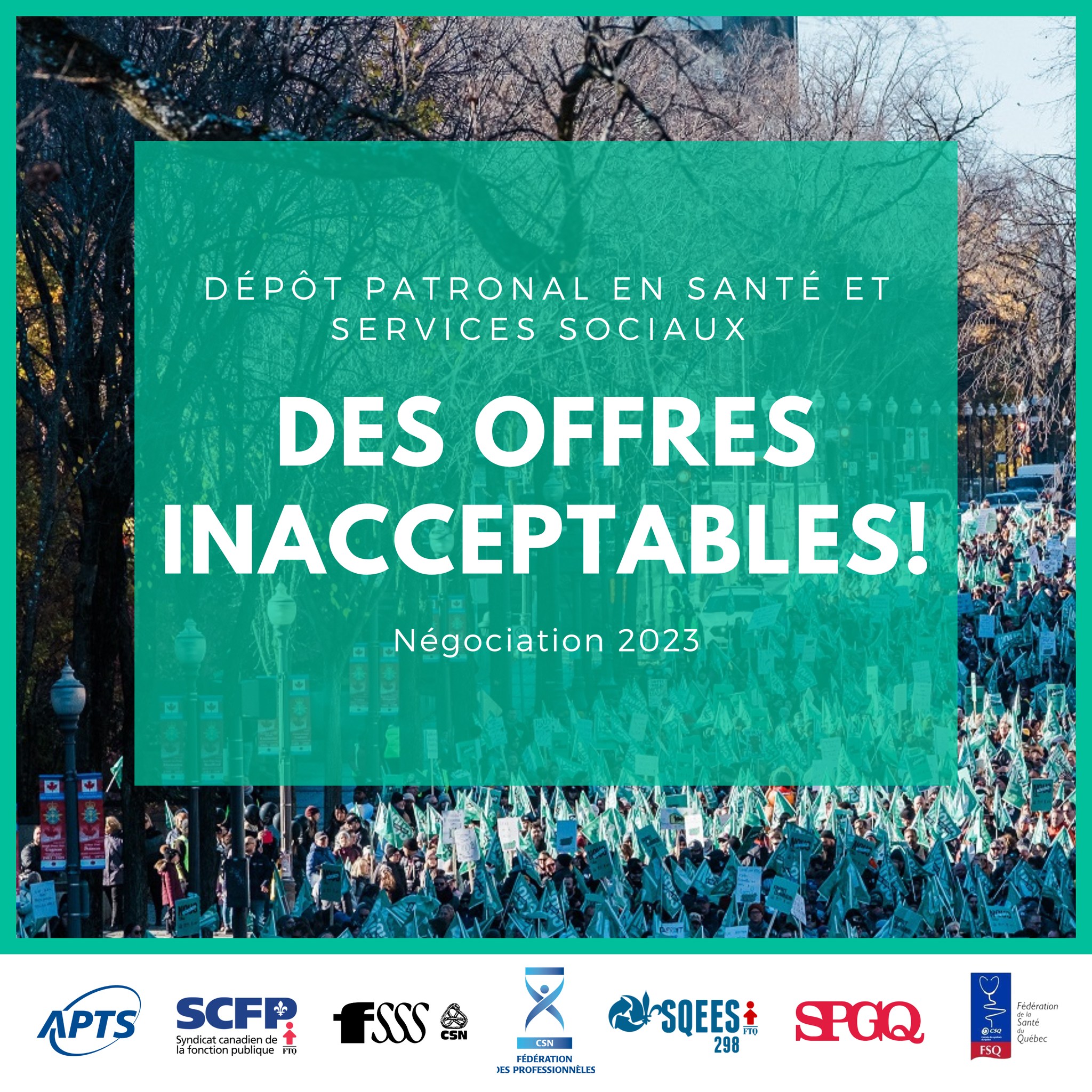
Pre-Hospital Sector in Quebec
• Urgent Need to End Around-the-Clock On-Call Scheduling for Paramedics
National Actions for Migrant Workers' Rights
• Year End Actions Demand Justice and Status for 1.7 Million People
Quebec Government Tables Offers to Public Sector Workers
Workers' Reject Attempt to Impose Wages and Working Conditions
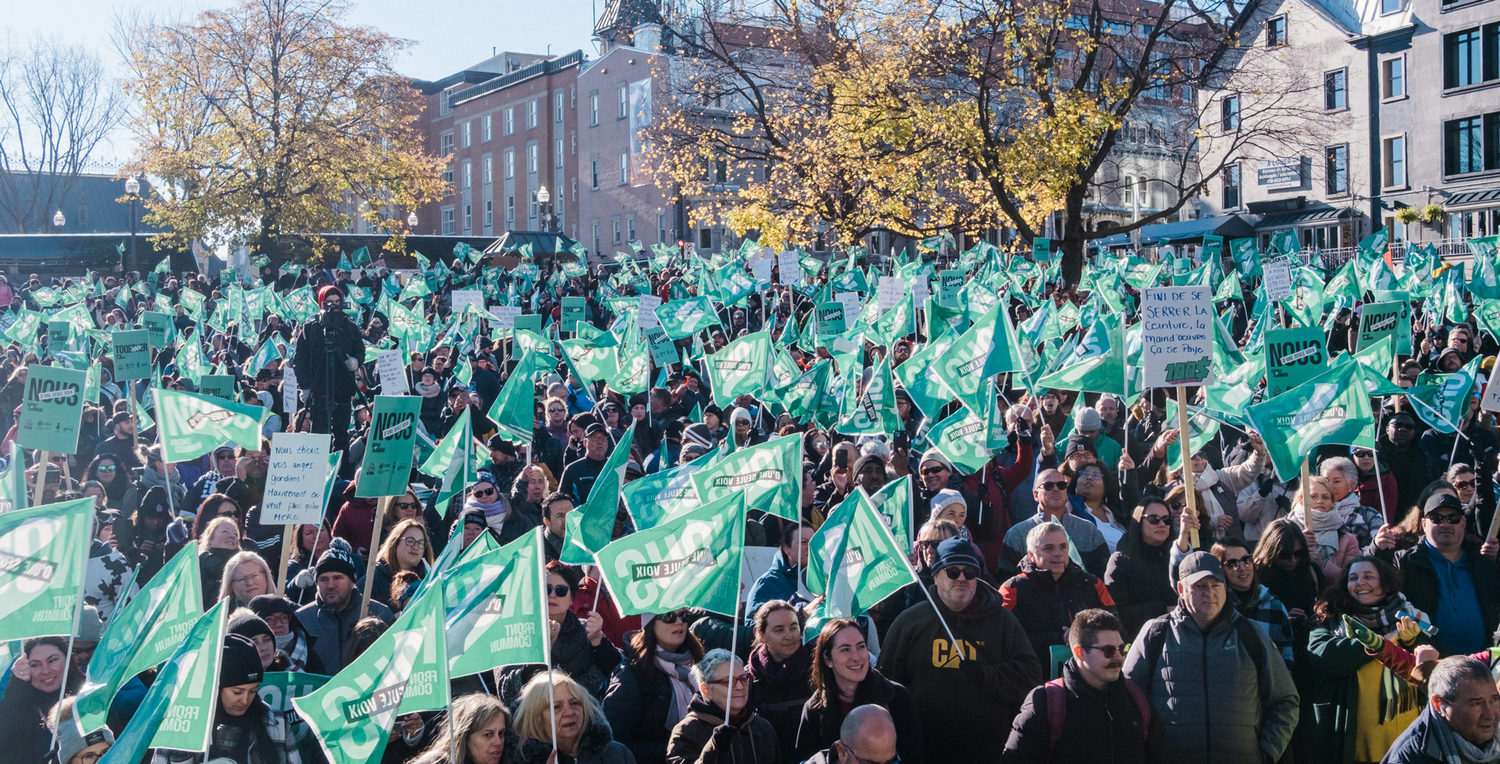 Quebec public sector workers deliver their demands to the National Assembly, October 28, 2022.
Quebec public sector workers deliver their demands to the National Assembly, October 28, 2022.
On December 15, Sonia LeBel, Minister Responsible for Government Administration and Chair of the Treasury Board, tabled the Quebec government's offers to the 600,000 public and parapublic sector workers, whose collective agreements expire on March 31, 2023. She announced the government's wage offer and presented its approach to what she referred to as broadening the debate in terms of "on the ground results in work organization." The unions denounced the wage proposal, which they called insulting, and the approach to the organization of work as unacceptable measures the government is trying to impose in lieu of negotiating wages and working conditions in "good faith bargaining."
Government's Opposition to Collective Bargaining
Half of the press conference on the government's offers was devoted to the announcement of public forums amongst "partners," such as the government, unions, health care employers' associations, professional associations and perhaps others. Three public forums are planned: the Classroom Team, the Care Team and the Mental Health Team.
During the previous round of negotiations, public sector workers opposed such forums as a means of avoiding collective bargaining by sitting at the tables where workers and their unions bring the demands and solutions they want implemented. According to the government, the forums would be held concurrently with and throughout the negotiations. Furthermore, the government is to allocate money for non-negotiated measures dependent on what it declares are its priorities.
"We need to better identify what will facilitate the implementation of the foundational changes in the sector that our government has identified as priorities," said the Treasury Board Chair during the press conference.
She outlined the aim of the forums to ensure "foundational changes" by saying:
"On the union side, the management side as well as for the other players involved, we must all get out of our comfort zone. We have to go beyond traditional processes, respective gains and the usual ways of doing things. We are aware that this important shift may cause discomfort. But we want everyone to take this opportunity to do much better for our people on the ground."
The government's record shows that it does not in fact care about "the people on the ground." The recurring key words in the press conference were "flexibility," "decompartmentalization," and "agility " -- all buzzwords which accompany the defunding and privatization of services. Workers are already fully aware of what they mean -- deteriorating working conditions and care within the system, suppression of the workers' participation in solving the problems, burnout, etc.
The Legault government is moving full speed ahead with the neo-liberal anti-social offensive which decimates social programs and destroys public services. The more narrow private interests usurp the political authority, the more they dictate that the workers must subordinate themselves to whatever wages and working conditions they wish to impose. What used to be called collective bargaining conducted in good faith no longer exists. This leaves the workers with the only option of waging the fight in defence of their rights in the court of public opinion.
Public sector workers have rejected what the government calls its "offers" and are stepping up their mass struggle for their rights which is also the fight for the services the people require.
Insulting Wage Offer
The government wants the workers to sign five-year collective agreements with a total wage offer of nine per cent: three per cent in the first year and 1.5 per cent over the next four, or 1.8 per cent on average per year. In addition, there would be a one-time lump sum payment of $1,000 upon the signing of the agreement, which is not counted as part of wages and therefore not part of the calculation for pension and vacation income. The government claims it is adding another 2.5 per cent that it is falsely including in the wage offer, as the amount is dependent on what the government calls achieving "its priorities." The wage offer does not include any cost of living allowance. With an inflation rate of 6.8 per cent for 2022 and a projected rate of about five per cent for Quebec in 2023, the offer constitutes a major cut in real wages for public sector workers. According to the Institut de la statistique du Québec, public sector workers earn on average nine per cent less than private sector workers doing similar work. The offer runs directly counter to the demand of workers and the public to attract and retain workers in public services. Any additional money is made conditional upon public sector employees submitting to government dictate on the direction of public services. This negates the immense value that public sector workers create for society and is an insult to them as they keep services going against all odds, providing care, saving lives and teaching the youth at the risk of their own health, while successive neo-liberal governments continue to devastate these services.
During the press conference when the offers were announced, the Treasury Board Chair gave the usual line that the wage offer must take into account the Quebec government's capacity to pay. When it comes to paying the rich for the squandering of public funds, the government has an unlimited capacity to pay, however it considers its own workers as a cost to be reduced, not as creators of the social wealth, the basis for building Quebec, upon which they have a claim as a matter of right.
Her cynicism is such that she says that she shares the workers' view, that in and of themselves the issue of wages cannot solve all the problems in public services.
(Quotations translated from the original French by TML.)
Unions' Responses
The unions representing public sector workers immediately denounced the government's offers.
Common Front
On December 15, the Common Front issued a press release entitled "Impoverishing public sector workers, the worst solution." The Common Front represents some 420,000 public sector workers. It is made up of the Confederation of National Trade Unions (CSN), the Centrale des syndicats du Québec (CSQ), the Quebec Federation of Labour (FTQ) and the Alliance of Professional and Technical Health and Social Services Personnel (APTS).
 In denouncing the government's wage offers, the Common Front writes:
In denouncing the government's wage offers, the Common Front writes:
"Is the government serious when it says that public services are important? If so, why is it maintaining them in a state of failure? Why is it offering so little while knowing that other workers' wages will continue to increase? The past two years of the pandemic have been a stark reminder of what is wrong with our public services. In putting such poor working conditions on the table, it is choosing to perpetuate the labour shortage and all the problems which stem from that.
"In light of the facts, do you think people will choose public services or jobs offering better conditions? Public service employees are not the ones who should be paying for economic recovery or the fight against inflation. Are our members -- 78 per cent of whom are women -- going to be asked to tighten their belts yet again to help the economy recover? If the government is serious about wanting to provide sustainable solutions for services to the population, it should go back to the drawing board and reconsider its offers.
"The Common Front is demanding a permanent mechanism to protect against inflation and also improvements aimed at a general wage catch-up. Hence, for the year 2023, it is demanding $100 per week or the CPI [Consumer Price Index ]+ two per cent (based on the most advantageous formula), the CPI + three per cent for 2024, and finally, the CPI + four per cent for 2025."
Federation of Health and Social Services (FSSS-CSN)
In its December 16 press release FSSS-CSN, which has over 140,000 members, addressed the sectoral offers tabled by the Employer Negotiating Committee of the Health Care and Social Services Sector, saying:
"If the government is finally recognizing the problems we're experiencing, then we're still waiting for it to show an openness to implementing workers' solutions.
"For the FSSS-CSN, what stands out in this offer is the silence the employer maintains on several major issues. For example, its submission refers to Minister Dubé's Health Plan without mentioning that it aims to increase the role of the private sector in health care, while energies should instead be focused on consolidating the public network.
"The government proposes nothing to support personnel who must ensure continuity with the next generation of workers, nothing to recognize experience, nothing to implement ratios, nothing in terms of granting more vacation time to exhausted personnel, nothing to fight against privatization and to build on the expertise in the sector. Not a word about environmental measures either. All these innovative proposals coming out of our broad consultation with our members present opportunities to put the network back on its feet."
Interprofessional Health Care Federation of Quebec (FIQ)
 In its December 15 press release the FIQ, which represents approximately 76,000 members, wrote:
In its December 15 press release the FIQ, which represents approximately 76,000 members, wrote:
"The employer's salary offer is for nine per cent over five years, whereas the FIQ is demanding 12 per cent over three years, along with protecting purchasing power and a raise to make up for inflation over recent months.
"The government's offers clearly are not on par with the sacrifices health care professionals have been making for far too long. The government is clearly off target when it comes to being an employer of choice. Our members expect significant changes through better salaries and working conditions. We deserve to have the feeling of a job well done when we go home after a shift. We want recognition for our full value and we deserve work-life balance. Our members will undoubtedly be offended once they see the current offer."
On the topic of the public forums the FIQ writes:
"Once again, the government is proposing too many discussion forums on numerous topics. It wants to create lots of committees to talk about different subjects like team stability, mandatory overtime, and the organization of work time. That is a totally ineffective approach to rapidly resolving the problems in the health network.
"It proposes nothing concrete to put an end to mandatory overtime, nothing concrete to gradually reduce the use of agency staff, nothing concrete to recognize health care professionals' work and lessen their workload, as better [staff to patient] ratios would.
"Priority issues are handled at the bargaining table. There is no need for endless forums. The FIQ has concrete, doable solutions that can be quickly implemented to save the health network. The network is broken and we need to take quick action."
Amongst other things, the FIQ is demanding a commitment from the government for the adoption of a law on safe health care professional to patient ratios.
Autonomous Teachers' Federation (FAE)
On December 15, the FAE, which has approximately 60,000 members, wrote in a press release:
" An
initial on-the-spot analysis allows us to see that many of the
proposals are the same as in the last round of submissions. It is ironic
that the government is asking teachers to be nimble and innovative, to
be flexible, creative and agile, and to think outside the box, yet it is
serving up the same recipes. In teacher speak, the agility, flexibility
and nimbleness called for throughout the tabled offers in various ways
is likely to be received negatively by teachers. The pressure that the
government is now putting on them represents an increase in workload.
An
initial on-the-spot analysis allows us to see that many of the
proposals are the same as in the last round of submissions. It is ironic
that the government is asking teachers to be nimble and innovative, to
be flexible, creative and agile, and to think outside the box, yet it is
serving up the same recipes. In teacher speak, the agility, flexibility
and nimbleness called for throughout the tabled offers in various ways
is likely to be received negatively by teachers. The pressure that the
government is now putting on them represents an increase in workload.
"Currently, many teachers in the system are stretched to the limit
and are in distress. Many have collapsed. Others have made the choice to
leave before that point. The number of
desertions and shortage of teachers in the education sector is
unprecedented.
Unfortunately, despite the government's desire to find solutions for the
most glaring problems in the school system, the current offer does not
meet three criteria: it does not make students want to train as
teachers; it does little to improve the working conditions of practicing
teachers; and it
does not encourage the return of teachers who have left the system.
Finally, because of the urgency of the situation, this offer should have
provided working conditions that prevent psychological distress and
prolonged absences, which is not the case."
Union of Quebec Government Professionals (SPGQ)
The SPGQ, with 52,650 members, wrote in its December 15 press release:
"The Union of Quebec Government Professionals (SPGQ) is particularly disappointed with the offers of barely 9 per cent over five years to government employees presented today at a press conference. In 2022, the consumer price index in Quebec was 6.60 per cent. It is expected to be 4.94 per cent in 2023 and 3.41 per cent in 2024. With a wage increase of 2.2 per cent in 2022, our members have seen their purchasing power shrink.
"Within a labour shortage context, the offers presented today are grossly inadequate to attract and retain professional government staff. 'The government is far from being an employer of choice, despite what the President of the Treasury Board suggests. Already, because of the need for a catch up on wages, the government is struggling to fill vacancies. Many positions remain posted for months on end, adding undue pressure on existing staff and creating other departures as part of a deplorable vicious circle,' SPGQ President Guillaume Bouvrette said.
"Finally, the SPGQ has raised other very important issues, including work organization, telework, insurance and retirement. The union expects the employer to address these as well in a serious manner and with the respect that professional staff deserve."
(Quotations translated from original French by TML. Photos: FSSS-CSN, Common Front, FIQ, FAE.)
Pre-Hospital Sector in Quebec
Urgent Need to End Around-the-Clock On-Call Scheduling for Paramedics

Paramedics in Abitibi-Témiscamingue and Northern Quebec protest
untenable shift scheduling, March 16, 2022.
Félix-Antoine Lafleur is President of the CSN Central Council of Abitibi-Témiscamingue and Northern Quebec. TML Daily is posting an interview with him conducted by Workers' Forum.
Workers' Forum: Recently, the media spoke of a real explosion of ambulance service breakdowns in Abitibi-Témiscamingue over the past few years. Can you tell us more about this?
Félix-Antoine Lafleur: Our experience in the field confirms that service disruptions are more and more frequent.
To understand the situation, you have to know that in our region, we're still working with around-the-clock on-call schedules, as opposed to hourly shifts. With the former, paramedics remain on call for seven consecutive days, 24 hours a day. They go about their daily lives, but must remain within a five-minute distance of their ambulance. In large centres, paramedics are on an hourly shift, stay in their ambulances, ready to respond to calls. They have a normal shift, with a start and an end time.
Also as far as service disruptions go, in Northern Quebec we're experiencing a labour shortage in many areas. For young paramedics, the coming generation, around-the-clock on-call schedules are not appealing, as they are forced to commit to long periods of availability. They want to have more flexibility and start a family. When you have to be on-call seven days a week, never knowing if you're going to be home for supper, work-family balance becomes very difficult. Paramedics are not attracted to those hours. So there are paramedics who, even though they are trained in the region, leave to work elsewhere where there is an hourly schedule, in order to have a family life.
All of this leads to situations of service disruptions because there's a lack of paramedics because of unattractive conditions. This creates an overload on those remaining.
We recently learned that every month, at the Dessercom ambulance company in Abitibi-Témiscamingue, there's a daily shortage of around 10 paramedics for the provision of basic services. That workload is assumed by the other paramedics. However they have limits -- there are limits to the amount of overtime one can work, to one's ability to physically move around a region. The vacant positions are being filled by paramedics who are already on a full-time schedule, so we are unable to fill the entire demand for services.
This has been going on for a long time. It's absurd when you consider that those on-call schedules were implemented in Quebec in 1989 as a temporary measure, until hourly schedules could be implemented everywhere. That was 33 years ago! Currently, the proportion of paramedics on on-call work is approximately 66 per cent of the total number of paramedics in the region. The rest, about one-third, are on hourly schedules.
There are many resource extraction jobs in the region, where the wages are higher than what paramedics are paid. So it's normal for them to wonder if it's worth going through all this, where the job is one of emergencies with known problems associated with one's psychological health. It's a very difficult job. It's possible to deal with these problems, through support of course, however many feel that they do not want to expose their family to this, so that quality family life is ensured.
The union movement has long been calling for a conversion to hourly shifts. It's true that hourly schedules require more staff, about twice as many as those working on-call schedules. However, hourly schedules attract paramedics. We need to invest, work out well-documented plans with clear timelines, so that the paramedics stay with us, so that early on in their career they know that they will be able to work on an hourly basis.
WF: Why do you think there's so much opposition to implementing hourly schedules everywhere?
FAL: The issues are economic. Staff costs would double, but that would be the only variable affected. The rest doesn't change. The vehicle, the equipment used, etc., remain the same.
And we're not asking for this conversion to be done in a cavalier manner, overnight. The issue is to have a plan that is clear. The labour shortage is not going to go away overnight. More and more labour will be needed to make the conversion. First we must put in place the winning conditions to make the conversion a reality. Instead of looking for excuses and saying it will never work, let's put the measures in place to ensure that we have enough staff.
At the heart of all this is an ideological debate. We have to decide what is going to take precedence, pure economic profitability or a service that's fair for the entire population. We must stop seeing the pre-hospital system as only an expense. We must see it as an investment towards the well-being of the society.
(Translated from the original French by TML. Photo: FSSS-CSN)
National Actions for Migrant Workers' Rights
Year End Actions Demand Justice and Status for 1.7 Million People
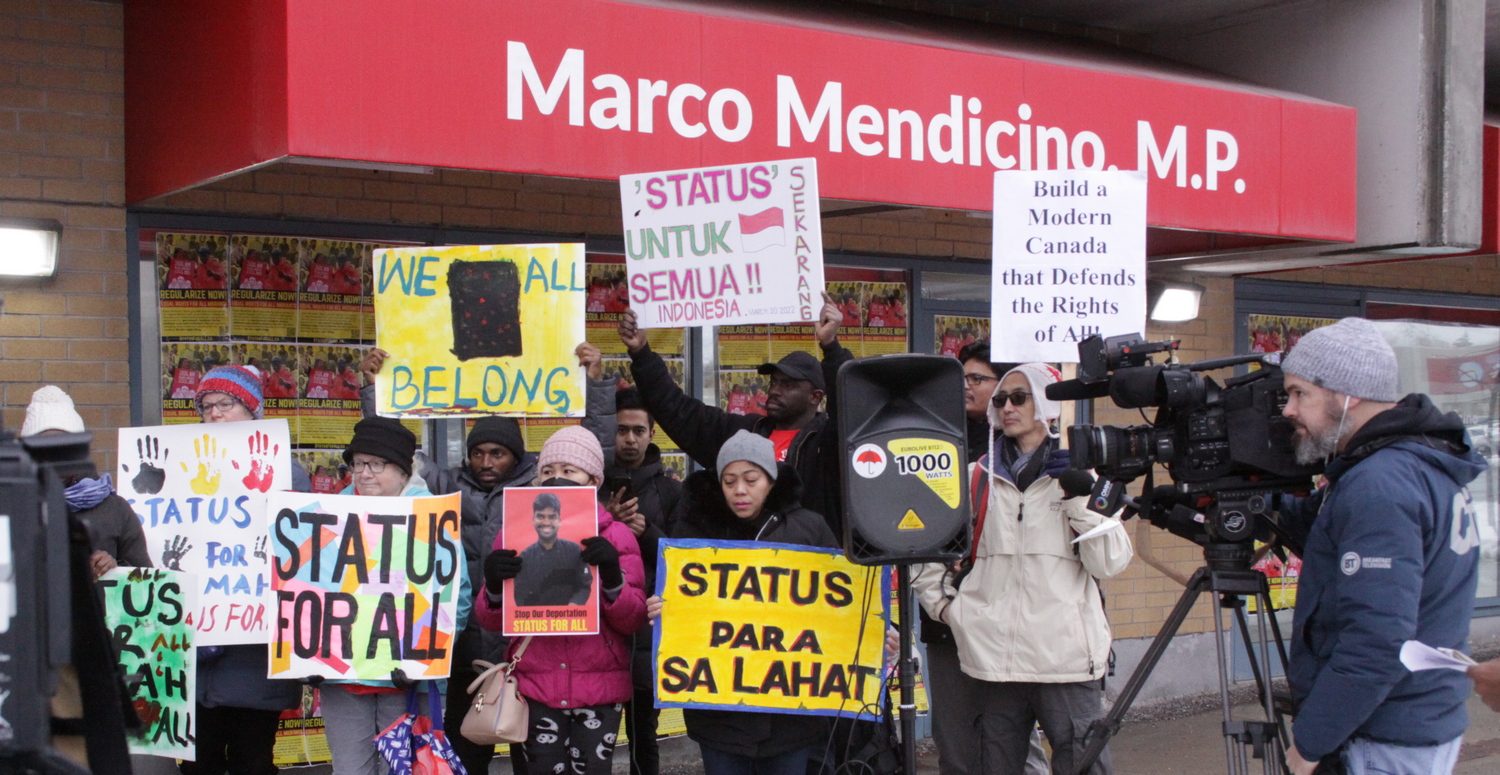 Toronto, December 16, 2022
Toronto, December 16, 2022
Actions were held in several cities from December 16-19 to demand that the Trudeau Liberals honour the pledge made by Prime Minister Justin Trudeau exactly a year ago to regularize the status of all migrants in Canada, in Toronto and Shediac, New Brunswick on December 16, Vancouver and various locations in Alberta on December 18 and in Montreal on December 19. The actions were organized by the Migrant Workers Alliance for Change and their allies.
In Toronto, migrant and undocumented workers and supporters held a rally at the constituency office of Pubic Safety Minister Marco Mendicino under whose watch the Canadian Border Services Agency deports an average of 31 people a day for being "illegal" in Canada.
The Toronto action heard from Abu Hena Mostafa Kamal via phone hook-up from Thunder Bay. He is a former international student from Bangladesh who is facing deportation on January 1 and said, "As a migrant student, I had to take jobs with bad working conditions and I could not speak up because of my status. Without permanent status, I feel like immigrants like me are on a leash, we are disposable workers with an expiry date. I am speaking up for everyone. I want my deportation stopped. My life is here. I have family and friends here. I want the Prime Minister to keep his promise made a year ago to deliver a regularization program without caps and without exclusions. We need status for all."
Another speaker at the Toronto action was Fatumah Najjuma, a Ugandan refugee and a single mother with a Canadian-born daughter who is working as a personal support worker. She is facing deportation because her refugee claim has been denied. She asked why the Canadian government is persecuting her. "Why is the Canadian government trying to separate me from my Canadian daughter, her only living parent? I am here today with the voices of the 60,000 people who signed the petition calling on the government to let me stay here in Canada and for all undocumented people to have permanent residence."
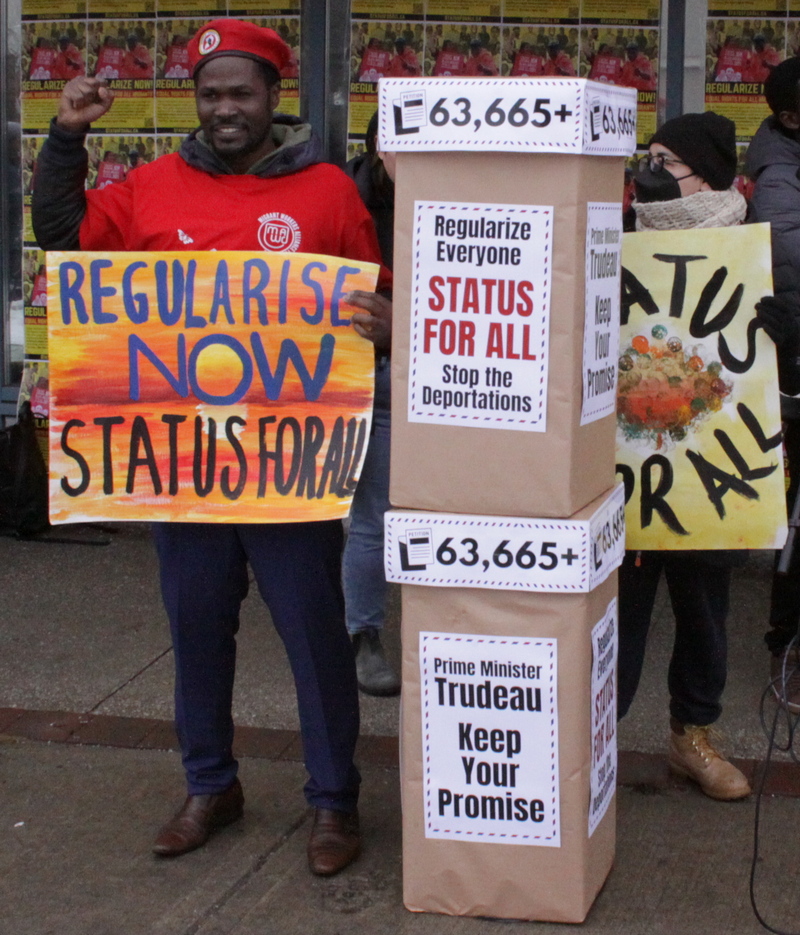 Another
Ugandan migrant worker, Jane, who is also facing deportation spoke
about the injustice of how migrant workers are treated in Canada. She
spoke about migrant and undocumented workers who worked through the
pandemic and contribute to Canada but are denied basic rights to health
care and
other services and live each day under threat of being picked up by the
immigration authorities. She called for Canada to do the right thing and
grant permanent residence to the 1.7 million people in Canada who for
various reasons are without status and deserve to live with dignity.
Another
Ugandan migrant worker, Jane, who is also facing deportation spoke
about the injustice of how migrant workers are treated in Canada. She
spoke about migrant and undocumented workers who worked through the
pandemic and contribute to Canada but are denied basic rights to health
care and
other services and live each day under threat of being picked up by the
immigration authorities. She called for Canada to do the right thing and
grant permanent residence to the 1.7 million people in Canada who for
various reasons are without status and deserve to live with dignity.
Following the speeches, a petition with more than 63,000 signatures calling for full and permanent status for all was delivered to Minister Mendicino's office while participants at the rally chanted, "Stop the Deportations, Status for All!" "No one Is Illegal! "and other slogans.
The action ended with a pledge by everyone to keep up the pressure on
the Trudeau government to keep its promise to regularize the status of
1.7 million people. International students, migrant workers, refugees
and undocumented people require full status as a right that belongs to
them as human
beings, so that they can live with dignity, have access to basic social
services and protections, and live with stability and peace of mind
while continuing to contribute to Canada.
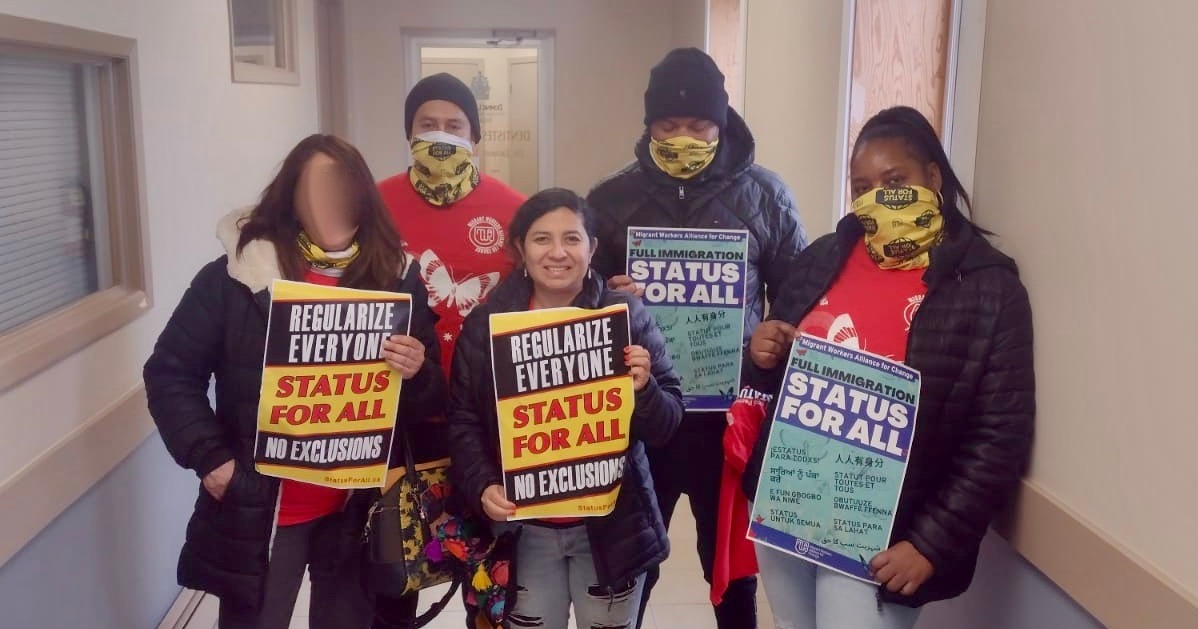
Migrant workers deliver letter to constituency office of Dominic
LeBlanc, Minister of Intergovernmental Affairs, Infrastructure and
Communities, Shediac, New Brunswick, December 16, 2022.
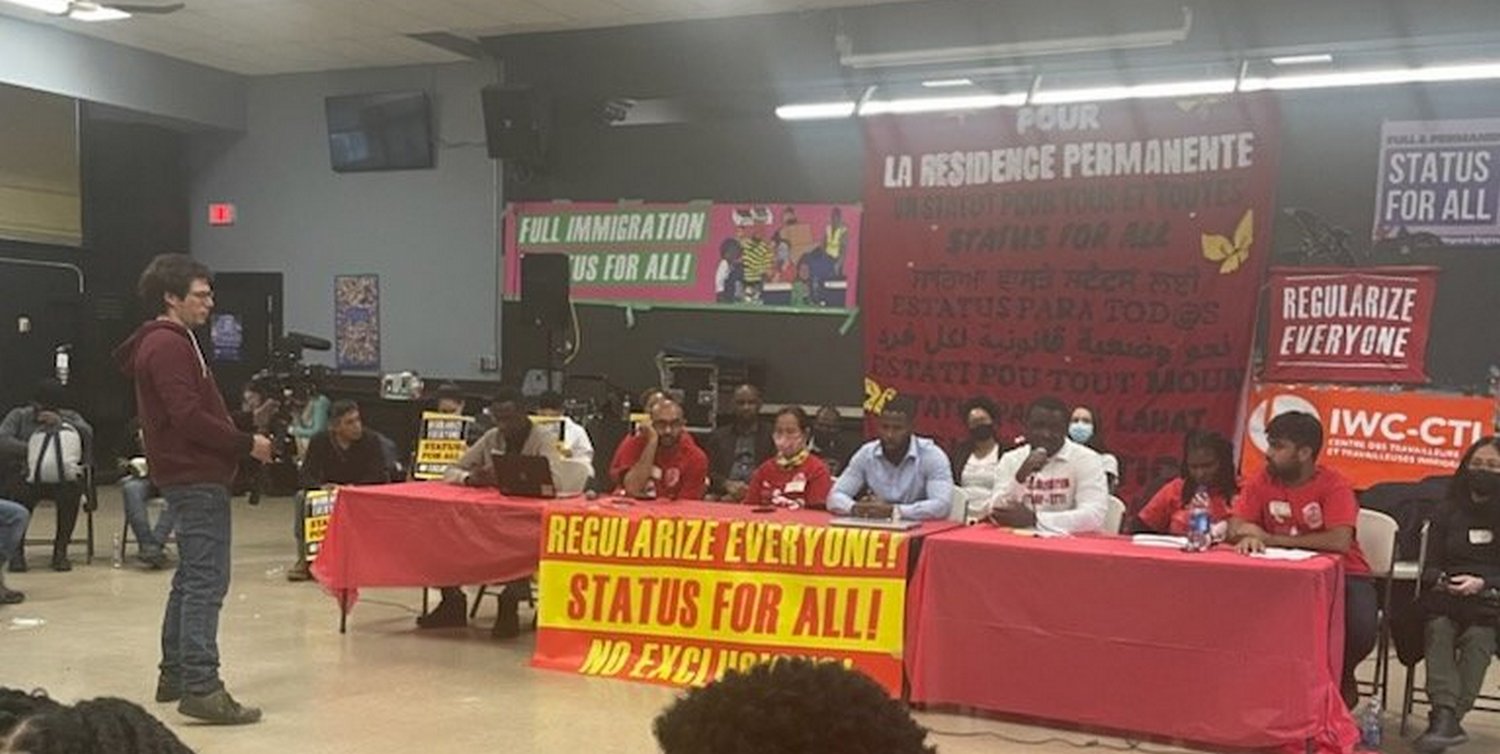 Public discussion in Montreal, December 19, 2022.
Public discussion in Montreal, December 19, 2022.
(Photos: TML, MWAC Canada, M. Jess.)
(To access articles individually click on the black headline.)
Website: www.cpcml.ca Email: editor@cpcml.ca

